State Legislature returns on Tuesday
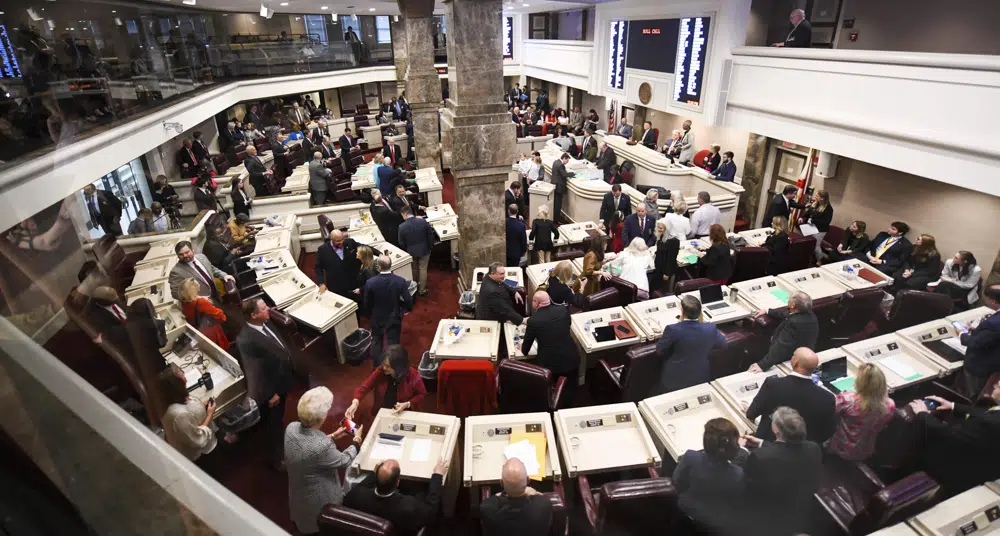
Both Houses of the Alabama State Legislature will be in Montgomery on Tuesday for Day 3 of the 2023 First Alabama Special Session to appropriate over a $billion in American Rescue Plan Act (ARPA) dollars. Alabama Governor Kay Ivey called the special session on Tuesday during her state of the state address. Days 1 and 2 of the special session were on last Wednesday and Thursday. The Alabama House of Representatives will convene at 1:00 p.m., and the Alabama Senate will convene at 3:30 p.m. At 10:00 a.m., there will be an informational meeting of the House Committee on Military & Veterans Affairs in Room 617. At 4:00 p.m., the Lee County Legislative Committee will meet for an organizational session in Room 429 of the Statehouse. No bills will be discussed. All four meetings can be viewed online at the Legislature’s webpage. By law, it takes a minimum of five legislative days to pass anything. The first day is for introducing the bill, and the second is to consider the bill in committee. On Thursday, the committee advanced the proposed legislation to the full House. The proposed spending plan would allocate: — $339 million for healthcare costs, including another $100 million to reimburse Alabama hospitals for their pandemic-related expenses. The nursing homes will also receive $100 million to reimburse them. The Legislature is also appropriating $25 million to support mental health programs and services. — Another $400 million for water and sewer infrastructure projects. This includes $195 million for high-need projects, $200 million for matching funds for public water and sewer systems, and $5 million for septic systems in the Black Belt region. — $260 million for improvement and expansion of broadband network access. — $55 million for projects that address the economic impacts of the pandemic. The legislation says the Department of Finance may distribute the money for a wide range of needs, such as food banks, long-term housing, and summer learning programs for children. In separate legislation, unrelated to the ARPA funds, the committee advanced a bill to pay $50 million from the existing budget surplus to pay off the remaining debt from the 2013 raid on the Alabama Trust Fund. The third day is to consider the bill on the floor of the first House. On the fourth day, the bill is considered in committee by the second House. On the fifth day, the bill can be passed by the second House and sent to the governor for her consideration. Of course, if the bill is delayed at any point for any reason, it will be necessary to continue to meet for additional legislative days – including weekends if necessary. The 2023 Regular Legislative Session will resume on March 21. One hundred seventy-four bills have already been pre-filed for the regular session. To connect with the author of this story or to comment, email brandonmreporter@gmail.com.
Hayneville receiving funds to upgrade failing sewer system
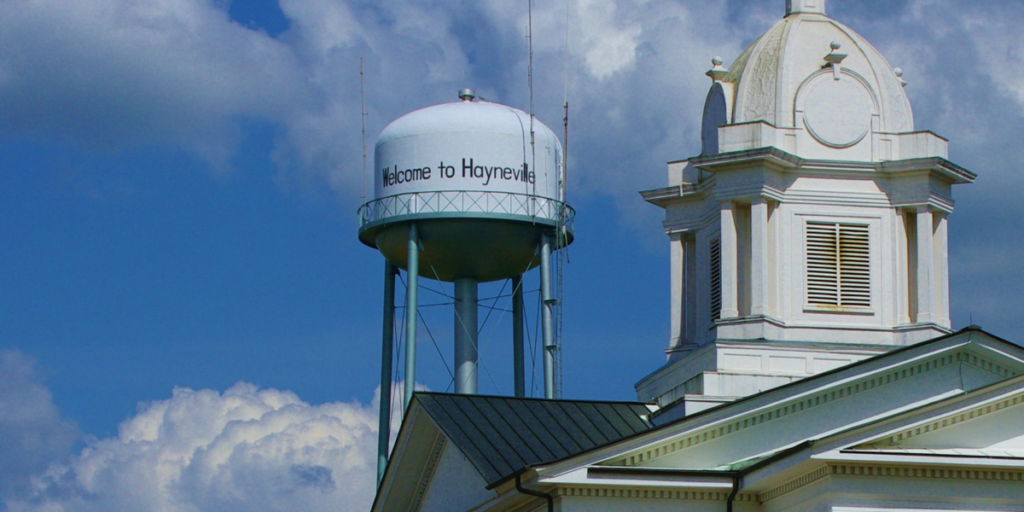
Federal and state officials on Friday marked the start of a $10 million project aimed at repairing and upgrading an Alabama community’s failing sewer system that has left residents dealing with pools of raw sewage at their homes. The project in Hayneville is being funded from money allocated to the state by the American Rescue Plan — a portion of which state officials steered to high-need water and sewer projects — and the Bipartisan Infrastructure Act. The Alabama Department of Environmental Management and local officials signed the funding agreements on Friday for the Infrastructure Act funding. The people of Hayneville, a community in Lowndes County of fewer than 1,000 people, have long lived with an ill-functioning sewer system that causes sewage to back up into their yards and homes. Hayneville Mayor Jimmie Davis said the sewage system is failing, and the small town doesn’t have the money to undertake this type of project. “The town has significant sewer and water needs that can have direct effect on residents’ health and well-being. Meeting those and other infrastructure needs in Lowndes County was a priority for the department,” Alabama Department of Environmental Management Director Lance LeFleur wrote in a statement. About one-third of the people in Hayneville live in poverty. The county’s plight has drawn the attention of national environmental and social justice activists, as well as federal and state officials. The heads of the U.S. Environmental Protection Agency and U.S. Department of Agriculture came to Lowndes County last year to announce a separate pilot program to help rural communities that face serious sewage problems like those in Hayneville. Many residents in the county aren’t connected to a centralized sewer system, and regular septic systems often don’t function properly because of the dense soil in the region. Alabama lawmakers voted last year to use about $225 million from the American Rescue Plan for water and sewer projects. The state also used Rescue Plan funds for broadband expansion and prison construction. The Alabama Department of Environmental Management also awarded $2.2 million to the Department of Public Health for a demonstration project in Lowndes County using special septic systems designed to cope with the dense soil in the Black Belt region. The U.S. Department of Justice in 2021 announced an environmental justice investigation into the county’s longstanding wastewater problems. Republished with the permission of The Associated Press.
Association of County Commissions of Alabama supports Amendment 2

The Association of County Commissions of Alabama (ACCA) is urging voters to vote to ratify Amendment Two to the State Constitution. Under the Alabama Constitution of 1901, local governments are largely prohibited from giving a “thing of value” to a public or private entity. Amendment 2 would authorize the state, a county, or a municipality to grant federal award funds or any other source of funding designated for broadband infrastructure by state law to any public or private entity for the purpose of providing or expanding broadband infrastructure. A “Yes” vote on Amendment 2 would allow local governments to work in unison with the state and use American Rescue Plan (ARPA) funds for broadband expansion. The ACCA encourages Alabamians to vote YES on Amendment 2 on the General Election ballot on November 8, 2022. Over the past several years, Alabama leaders have worked to expand essential broadband services across the largely rural state of Alabama. The COVID-19 global pandemic that closed schools and businesses and forced patients to visit their doctors online thru telemedicine has only heightened the necessity for internet access and made it glaringly evident that Alabama still has much ground to cover to effectively reach the underserved areas of our state. The ACCA said that considering the enormity of this feat, it is important that local leaders join the state in putting forth a concerted, collaborative effort to expand broadband services. Broadband providers are often hesitant to install broadband infrastructure in rural areas because of low subscription rates from consumers. Broadband expansion usually involves governmental entities providing incentives to these providers to install the requisite infrastructure in rural areas. It is, arguably, presently illegal for a local or county government to offer these incentives to a business or corporation. Amendment 2 would change that so that local governments can partner with the state government in incentivizing cable and other companies to extend broadband lines even into areas of the state where it is not commercially viable at this time in order to serve those residents that live there. The Alabama Constitution of 1901 is the longest in the world and is currently the oldest state constitution. It is frequently amended by the legislature, and voters are asked to ratify those amendments, including this year’s Amendment Two. To connect with the author of this story, or to comment, email brandonmreporter@gmail.com.
Congressional Budget Office says inflation to last into 2023
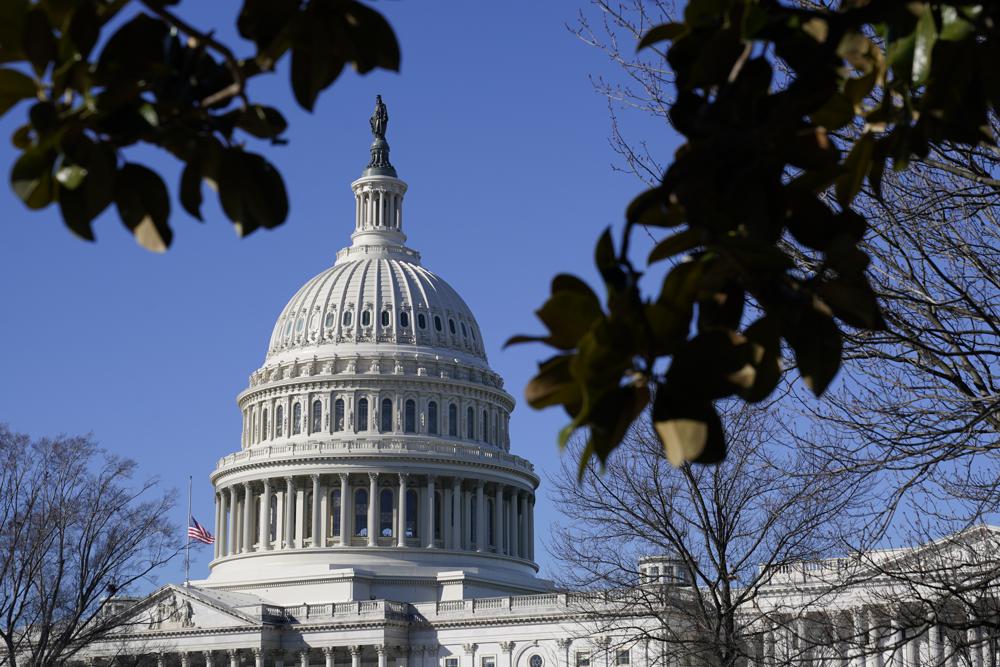
The Congressional Budget Office released an economic outlook Wednesday, saying that high inflation will persist into next year, likely causing the federal government to pay higher interest rates on its debt. The nonpartisan agency expects that the consumer price index will rise 6.1% this year and 3.1% in 2023. This forecast suggests that inflation will slow from current annual levels of 8.3%, yet it would still be dramatically above a long-term baseline of 2.3%. The 10-year estimates do contain positive news as this year’s annual budget deficit will be $118 billion lower than forecasted last year. That’s a byproduct of the end of pandemic-related spending and the solid job growth it helped to spur. As a share of the total economy, publicly held debt will drop through 2023. Still, the accumulated federal debt will likely continue to grow over the next decade to be equal to roughly 110% of U.S. gross domestic product. The Federal Reserve has been trying to reduce inflation by raising its benchmark interest rates, causing the interest charged on 10-year U.S. Treasury notes to increase substantially in recent months. One consequence is that the government will be spending more money this year to service its debt. By 2032, the yearly interest payments will nearly be $1.2 trillion, or more than what the federal government spends on defense. Still, the CBO cautions that its numbers “are subject to considerable uncertainty, in part because of the ongoing pandemic and other world events,” including Russia’s ongoing war in Ukraine. The report accounts at least for the first few months of the war, according to CBO. Economists have said coronavirus relief programs issued by both the Biden and Trump administrations have contributed to higher inflation levels. But high prices have also been fueled by a delay in action by the Fed, supply chain disruptions, and the tumult produced after Russia invaded Ukraine in February. Ben Harris, the Treasury Department’s assistant secretary for economic policy, tweeted on Tuesday that the factors driving inflation also include soaring corporate profits, driven by a lack of business competition — as well as businesses not being fully prepared for the reopening of the economy as pandemic restrictions were lifted. The administration has emphasized that its plan put the U.S. economy into a stronger place relative to the rest of the world because unemployment is a low 3.6%. “The American Rescue Plan has fostered an extraordinarily fast recovery and leaves us in a strong position to address the global challenges posed from supply chains and the economic fallout from Russia’s invasion of Ukraine,” he tweeted. The report says beyond 2032, “if current laws remained generally unchanged, deficits would continue to grow relative to the size of the economy over the following 20 years, keeping debt measured as a percentage of GDP on an upward trajectory throughout that period.” Maya MacGuineas, president of the Committee for a Responsible Federal Budget, told The Associated Press ahead of the release that the pandemic, war in Ukraine, and other factors point to the importance of reducing the annual deficit. “Unfortunately, the underlying story here is one of fiscally unsustainable positions, and on top of that, we have this added challenge of inflation and a reminder that external shocks continue to come at us,” she said. Republished with the permission of The Associated Press.
State signs prison construction contract, quiet on details
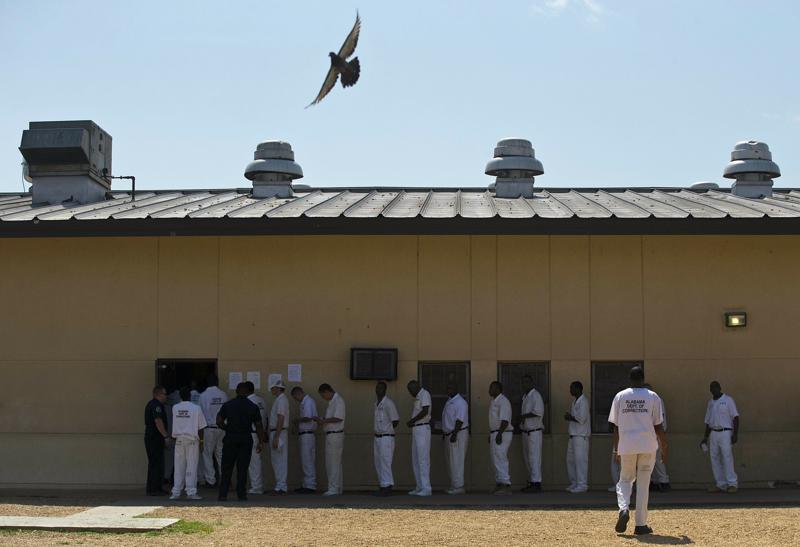
Alabama officials have signed a contract to build a new state prison — part of a $1.3 billion construction plan partly using pandemic relief funds — but have not released many of the details. A spokeswoman for Alabama Gov. Kay Ivey confirmed the state signed a contract with Caddell Construction Co., effective April 15 for construction of a specialized men’s prison facility in Elmore County, “that will provide enhanced medical and mental health services.” “The new facility will create a safer security environment for inmates and security personnel. Our construction timeline continues to remain on schedule,” Gina Maiola, a spokeswoman for Ivey, wrote in an email. The Alabama Department of Corrections on Wednesday declined to release a copy of the contract. A spokeswoman said it needed to be redacted and that would take some time because it is a lengthy contract. The department did not immediately respond to an email seeking information about the cost or the size of the prison. Ivey’s office indicated the prison system should be able to provide a copy of the “publicly available contract documents in the coming days.” Alabama lawmakers this fall approved a $1.3 billion prison construction plan that will use $400 million from the state’s share of American Rescue Plan funds to help pay for the construction. The construction plan included a new prison in Elmore County with at least 4,000 beds and enhanced space for medical and mental health care needs. It also included another prison with at least 4,000 beds in Escambia County, a new women’s prison, and renovations to existing facilities. Lawmakers had expected one of the construction contracts to go to Montgomery-based Caddell Construction. The legislation specified that, instead of the normal bid process, the state instead could negotiate directly with entities that were part of development teams that qualified for the projects under a lease plan Ivey’s administration had pursued but abandoned. Lawmakers said that would save time and build on the work already done. Ivey in October called the construction plan, “a pivotal moment” for improving the state’s criminal justice system. Critics of the plan said it did not address the underlying problems, such as low staffing, and was not a proper use of pandemic relief funds. Republished with the permission of the Associated Press.
What was approved in the Alabama 2022 legislative session

Alabama lawmakers on Friday ended an election-year session that saw Republicans push through measures ranging from gun legislation to a ban on gender-affirming medications for transgender minors. Here is a look at some of the measures that passed and failed in the 2022 regular legislative session: WHAT WAS APPROVED: PERMITLESS CONCEALED CARRY Alabama will become the 22nd state to allow people to carry concealed handguns without first undergoing a background check and getting a state permit. Alabama Gov. Kay Ivey signed the legislation into law soon after it was approved by lawmakers. The new law, which takes effect Jan. 1, 2023, will end the requirement for a person to get a concealed carry permit to carry a loaded handgun concealed under their clothes, in a car, or in a purse or bag. The proposal had been introduced for years in Montgomery, before finally winning approval this year. TRANSGENDER MEDICATION BAN FOR PEOPLE UNDER 19 The bill would make it a felony, punishable by up to 10 years in prison, to prescribe puberty blockers or hormones to transgender people under age 19 to help in their gender transition. Alabama is the second state to try to impose a ban on gender-affirming care for minors and the first to impose criminal penalties. Ivey signed the legislation a day after it was approved. Groups have vowed to challenge the law in court. A similar measure in Arkansas, which would have banned doctors from prescribing the medications, was blocked by a federal judge. “DON’T SAY GAY”/ BATHROOM BILL The bill would mandate that in public K-12 schools, students can only use multi-person bathrooms and locker rooms that correspond with the gender on their original birth certificate. It also includes what critics have dubbed the “Don’t Say Gay” provision that would prohibit classroom instruction or discussion on sexual orientation or gender identity for students in kindergarten through the fifth grade. Ivey signed the legislation Friday. It also is expected to be challenged in court. TEACHER PAY Alabama lawmakers approved the largest teacher pay raise in a generation to try to combat a teacher shortage. Teachers with nine or more years of experience would get raises ranging from 5% to up to nearly 21%. A teacher with a bachelor’s degree and 20 years of experience would see their minimum salary rise from $51,810 to $57,214. Teachers with less than nine years of experience would see a 4% raise. PANDEMIC MONEY Alabama will spend $772 million in pandemic relief funds from the American Rescue Plan on a mix of broadband, water, sewer projects, and health care reimbursements. Lawmakers met in a January special session to approve the spending plan that had broad bipartisan support. Alabama faced criticism last year for using $400 million — nearly 20% of the state’s total $2.1 billion allocation from the American Rescue Plan — for prison construction. DELAY OF READING PROMOTION Alabama lawmakers voted to delay a high-stakes requirement to hold back third-graders who don’t meet reading benchmarks. The requirement was set to begin this spring. Lawmakers voted to delay it until the 2023-2024 school year. Many lawmakers expressed concern about putting the requirement on students after the pandemic interrupted classroom instruction for two years. TAX CUTS Lawmakers approved a series of tax cuts for people and businesses. One bill will increase the optional standard deduction by $1,000 for married taxpayers and by $500 for single, married filing separately and head of household taxpayers. It would also increase the adjusted gross income range allowable for the maximum optional standard deduction and for the dependent exemption. Another approved bill will exempt up to $6,000 in retirement income from state income taxes for people who are 65 years of age or older. REMOVING RACIST LANGUAGE Alabama voters in November will vote on a plan to strip racist language, such as provisions about poll taxes and segregated schools, from the Alabama Constitution. The sections were invalidated by court rulings but remain in the document. The plan also reorganizes the massive, sprawling document that has nearly 1,000 constitutional amendments to try to make it more user-friendly. WHAT FAILED: Lottery and casino legislation failed again amid longstanding disputes over who should get casino licenses. A sweeping school choice bill that would have let parents tap $5,500 per year to pay for private school or other school options also failed. A bill to ban a list of “divisive concepts” from being taught in K-12 classrooms and state worker training was approved in the House of Representatives but did not get a Senate vote. Republished with the permission of the Associated Press.
Hundreds of Alabama systems apply for water, sewer grants
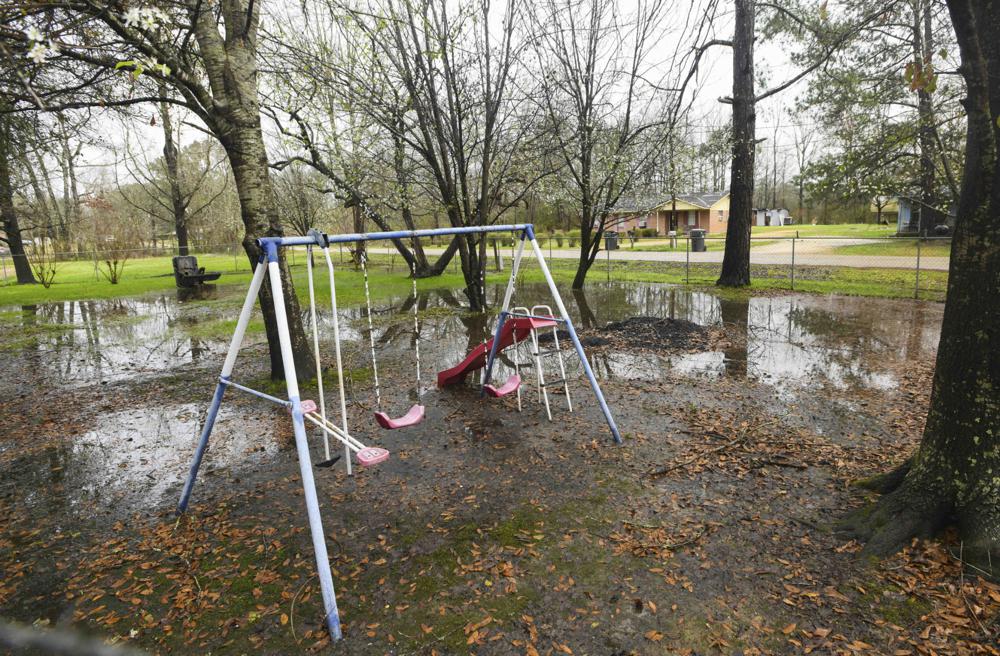
More than 400 Alabama water and sewer systems have applied for grants funded by pandemic relief money, according to the Alabama Department of Environmental Management. Alabama lawmakers this winter voted to use $225 million out of the state’s share of American Rescue Plan funding to fund high-need water and sewer projects. “This is an historic opportunity to address longstanding water, and sewer needs to benefit hundreds of thousands, and potentially millions, of Alabamians,” ADEM Director Lance LeFleur said in a statement. The state will use $120 million for previously identified emergency or high-need projects and will not require a local match; $100 million for grants that may require a local match based on ability to pay; and $5 million to address longstanding problems in the Black Belt region of the state. Rep. Kelvin Lawrence, a Democrat from Hayneville, said in a press release that the funding could be life-changing for many people in his Black Belt district. Wastewater treatment is a decades-old problem in parts of the area, where poor communities often lack traditional sewer lines. Septic tank systems are a poor alternative in some areas because the region’s heavy clay soil traps water near the surface. “Whether you’re rich, poor, young or old, black or white, it doesn’t matter. Every citizen in the state of Alabama should be afforded the opportunity to have clean drinking water and also to dispose of their waste in a proper way so they won’t have to worry about dealing with health issues,” Lawrence said. The Justice Department said it had started an environmental justice investigation into impoverished Lowndes County’s wastewater problems, which have left some residents with sewage in their yards. Republished with the permission of the Associated Press.
Alabama lawmakers begin session amid COVID surge, elections
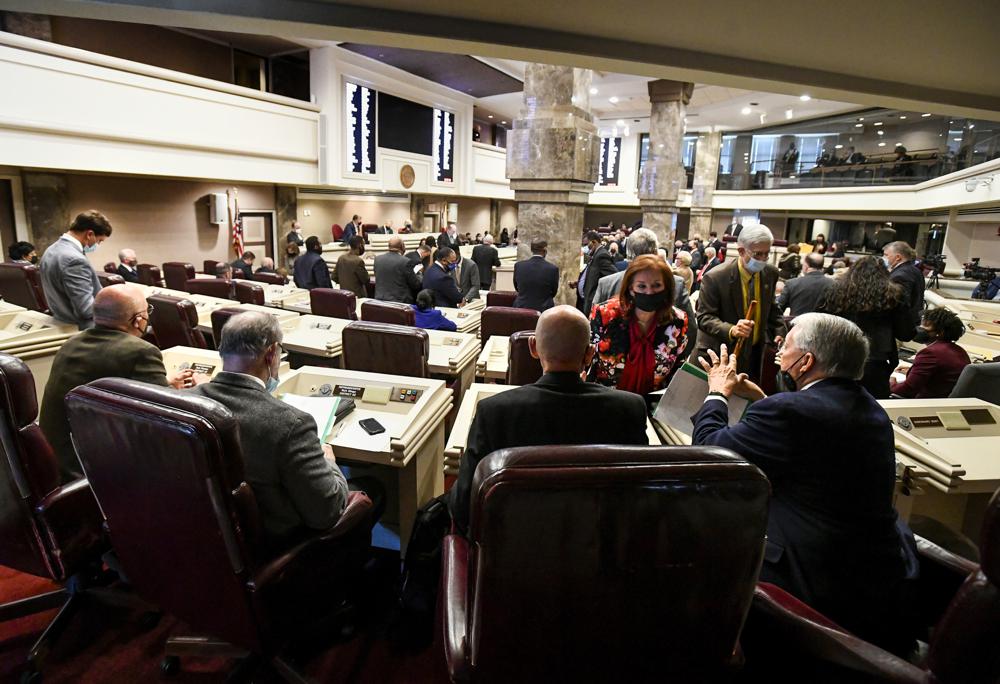
Alabama lawmakers returned to Montgomery on Tuesday to begin the 2022 legislative session against a backdrop of rising coronavirus cases and looming elections, faced with major decisions, including how to use the state’s remaining pandemic relief funds. Congress allocated $2.12 billion for Alabama through the American Rescue Plan. The state received the first half in June and has $580 million remaining after steering $80 million to hospitals and nursing homes and $400 million on a controversial prison construction plan. A key topic for the session will be how to use those remaining pandemic dollars. “We’re going to be looking at major priorities such as water and sewer grants for the state. Broadband will be an issue and health care,” House Speaker Mac McCutcheon said. Senate President Pro Tem Greg Reed agreed those will be funding priorities and said it is important lawmakers spend the money on projects that will have lasting effects. “We talked about water and sewer projects. These are things that we can spend the resources on that are beneficial for the people of Alabama for many, many years in the future,” Reed said. House Minority Leader Anthony Daniels, a Democrat from Huntsville, said that in addition to needs like broadband, Democrats would like to see health care, child care, affordable housing, and pandemic recovery for businesses addressed. “COVID-19 is not going away. In fact, the numbers are at their highest right now with this new variant,” said Daniels, who just recovered from his second bout with the coronavirus. “We just have to think through where our investments will be more well-spent and yield the returns that we need long term.” Key lawmakers said there are discussions with Gov. Kay Ivey about holding a special session to focus on the pandemic relief funds. A spokesperson for Ivey said last week that the governor “wants this to be an early priority for the Legislature.” Unlike previous years, state budgets are seeing significant growth because of increases in sales and income tax collections. Lawmakers are expected to approve a pay raise for teachers and state employees. Key lawmakers, including Sen. Greg Albritton, chairman of the Senate General Fund budget committee, said raises up to 4% are under discussion for both teachers and state employees. Lawmakers are coming to the Statehouse as Alabama experiences a record jump in COVID-19 cases fueled by the highly contagious omicron variant. The Statehouse is open to the public, but some safety precautions have been put in place. The 105-member Alabama House of Representatives is requiring masks in common areas such as hallways. Seating will be limited at Ivey’s State of the State address. Representatives can choose to vote from an overflow room if they feel unsafe in the crowded chamber. House Republicans this year are pushing what they have dubbed the “Standing Tall for Alabama” agenda, which includes legislation to do away with the requirement to get a permit to carry a concealed handgun in public. The backing increases the chances of approval for the proposal that has failed for several years in Montgomery. However, the proposal continues to face opposition from state sheriffs who say it will undermine public safety. The House GOP agenda also includes anti-critical race theory legislation and the creation of a felony crime for assaulting a first-responder. Daniels called the GOP agenda a “waste of time” as the state continues to deal with the ongoing COVID-19 pandemic. Lawmakers face primaries on May 24. An election-year session traditionally brings a flurry of legislation and resolutions that lawmakers believe will appeal to their voters. However, legislators also will feel pressure to finish up the session quickly in order to hit the campaign trail. Republished with the permission of the Associated Press.
Special session possible on relief fund spending

Alabama lawmakers say there may be a special session on how to spend the state’s remaining pandemic relief funds. Key lawmakers said there are discussions with the governor’s office on calling a special session in which lawmakers would focus only on the relief money allocation during a portion of the upcoming regular session that begins Tuesday. A spokesperson for Gov. Kay Ivey said the governor “wants this to be an early priority for the Legislature.” “She has stressed time and again that we need to invest this one-time money, not just casually spend it. Governor Ivey will continue having conversations with the Legislature, who is ultimately tasked with allocating these funds. The sooner these dollars reach the people of our state, the better,” Gina Maiola said via text message. Congress allocated $2.12 billion for Alabama through the American Rescue Plan. The state received the first half in June and has $580 million remaining after steering $80 million to hospitals and nursing homes and $400 million on a controversial prison construction plan. The state will receive a second $1.060 billion in May or June of this coming year. The state also has $191 million allocated through the America Rescue Plan’s Capital Projects Fund. State House Ways and Means General Fund Chairman Steve Clouse, R-Ozark, has said he expects lawmakers will allocate the $580 million this session and leave decisions on the $1 billion — which the state won’t receive until after the session is concluded — until a later time. Clouse said he supported the idea of a special session to isolate the issue and to get money flowing for infrastructure projects. “We need to go ahead and get the money in the pipeline because it’s going to be hard to get these projects completed in a timely manner over the next few years,” Clouse said. House Minority Leader Anthony Daniels said he also supports the idea. “It probably should be isolated by itself, so we are only focused on that. I can see the point for having a special within the regular session to isolate how, and what, to spend those COVID dollars on,” Daniels, D-Huntsville, said. Republished with the permission of the Associated Press.
Lawmakers face decisions on $1.5 billion in relief funds

Alabama lawmakers face decisions in the coming months on how to spend more than $1.5 billion in pandemic relief funds, and legislative leaders say infrastructure projects — such as broadband and sewer projects — are expected to be a spending priority. Congress allocated $2.12 billion for Alabama through the American Rescue Plan. The state received the first half in June and has $580 million remaining after steering $80 million to hospitals and nursing homes and $400 million on a controversial prison construction plan. The state will receive a second $1.060 billion in May or June of this coming year. The state also has $191 million allocated through the America Rescue Plan’s Capital Projects Fund. Senate President Pro Tempore Greg Reed, R-Jasper, said how to use the money will be one of the major issues before lawmakers in the session that begins January 11. He said proposals are still being developed, but he expects money to be steered toward a combination of local and regional projects as well as reimbursements to hospitals and other health care providers that have been hard hit during the pandemic. “You’re going to be looking at projects that are going be for individual communities,” Reed said adding that would likely be done by establishing a grant or application process. He said they are also considering line-item expenditures for “major projects that are going to be regional projects” as well as tasking the Department of Finance with managing additional reimbursement to health care providers. “There would be potentially additional dollars in healthcare that would need to go over and above the resources that we’ve already given that would go for reimbursement with hospitals, nursing homes, others.” Senate Finance and Taxation General Fund Chairmen Greg Albritton, R-Atmore, said legislative leaders plan to meet with Gov. Kay Ivey next week. He said every lawmaker has their own idea of how the remaining $580 million should be utilized. “I want this money to be invested in the future, not paying for the past. I want this money to go into matters that will make a difference for the next generation,” Albritton said. House Ways and Means General Fund Chairman Steve Clouse, R-Ozark, said he expects lawmakers will allocate the $580 million this session and leave decisions on the $1 billion — which the state won’t receive until after the session is concluded — until a later time. He anticipates a large amount of money will be put toward rural broadband and water and sewer projects. Clouse said the pandemic highlighted the lack of internet access with many children not having internet access as they tried to learn from home. “I don’t think we need to get into operating expenses and stuff that is going to require recurring revenue streams. This should be one-time capital type projects,” Clouse said. Alabama took criticism for using $400 million of pandemic relief funds for prison construction. Legislative Republicans said it was an allowed use, but critics argued it was not a proper use of the money. “Maybe our priorities will finally catch up after our $400 million we spent on prisons,” Rep. Chris England, D-Tuscaloosa, said. England said hospitals and nursing homes will be seeking additional resources, which he said is “especially relevant now that it looks like we are in the middle of another surge.” Hospitals have seen labor costs surge as they turn to contract travel staff to fill staff shortages as well as expenses for setting up clinics for monoclonal antibodies. “We’ve missed several opportunities to spend a lot of that money on education. While we were running CRT (critical race theory) out of the classroom, we ignored COVID sitting right there. We probably need to focus a little bit more resources on making sure our kids are safe from a real problem, versus an imaginary one,” England said. Republished with the permission of the Associated Press.
Issues to watch in the 2022 legislative session
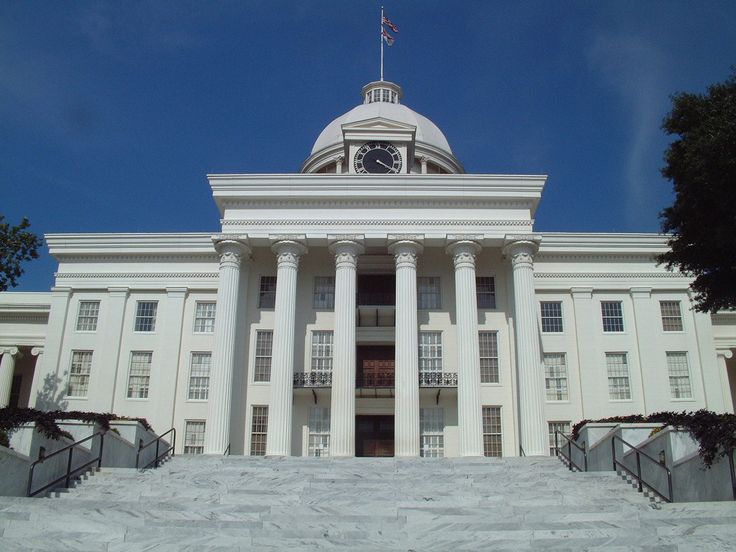
Alabama lawmakers return to Montgomery on January 11 for the 2022 legislative session. Here are some issues to watch as the session begins. PANDEMIC RELIEF FUNDS Lawmakers face decisions on how to spend over $1.5 billion in state relief funds from the American Rescue Plan. Congress allocated $2.12 billion for Alabama through the American Rescue Plan. The state has so far received $1 billion and has $580 million remaining after using $400 million for prison construction and $80 million to reimburse hospitals and nursing homes. Key lawmakers say they expect infrastructure projects to be among the proposed uses. GUN PERMITS Lawmakers are expected to again debate legislation that would do away with the need to get a permit to carry a concealed handgun. The legislation, known as “constitutional carry” to proponents, has been introduced for several years but never passed as it faced opposition from law enforcement. “I think, based on the feedback that I’m getting from members of the Senate, there’s going be a lot of interest in the constitutional carry legislation. I’ve heard that from both House and Senate members. So I think it will definitely be an issue that will be debated and will be something that we will deal with in session, for sure,” Senate President Pro Tempore Greg Reed said. ABORTION Nearly two dozen House Republicans are backing legislation similar to a Texas law that would ban most abortions and allow anyone to file civil lawsuits against violators and collect damages. The bill titled the “Alabama Heartbeat Act” would prohibit medical providers from performing an abortion once cardiac activity is detected, usually around six weeks and before some women know they are even pregnant. The measure would allow private citizens to file civil lawsuits against anyone who “aids or abets” an abortion and to collect at least $10,000 in damages for each performed abortion. GAMBLING Lottery and casino legislation will again be introduced in Alabama’s upcoming legislative session — with the goal of getting the measure before voters in November — but the outlook for the proposal is unclear. Some leaders in the House of Representatives have expressed skepticism that the bill will get a vote this year. Republican Sen. Greg Albritton of Atmore said he plans to propose a constitutional amendment that would include a state lottery, a compact with the Poarch Band of Creek Indians, and a yet-to-be-determined number of other gambling sites. Gambling legislation has failed in past sessions under a mix of conservative opposition and disputes over the number of casinos and who would have casino licenses. EDUCATION BILLS Republican Sen. Arthur Orr of Decatur is proposing an overhaul in math instruction that would include more math coaches in schools, summer programs, and interventions. Eventually, in 2028 fifth grade students would need to show they were meeting certain math benchmarks to move to the sixth grade under the proposal. Lawmakers previously approved a similar promotion requirement for third-graders with reading. However, Alabama Gov. Kay Ivey has said she will ask lawmakers for a one-year delay of the reading promotion requirement after the pandemic interrupted classrooms. The high-stakes promotion requirement for third-graders is currently set to take effect this spring. REMOVING RACIST LANGUAGE The Committee on the Recompilation of the Constitution has proposed a plan to strip racist language, such as provisions about segregated schools, from the state’s governing document. The sections were invalidated by court rulings but remain in the document. It also reorganizes the massive, sprawling document that has nearly 1,000 constitutional amendments to try to make it more user-friendly. If approved by lawmakers, it would go before voters in November 2022. TRANSGENDER TREATMENT BAN Lawmakers could again debate an attempt to forbid doctors from providing gender-confirming hormone treatment, puberty blockers, or sex reassignment surgery to treat transgender minors. The Alabama Senate approved the bill in 2021, but it did not get a vote in the House of Representatives. Arkansas became the first state to enact such a measure, but a federal judge in June blocked it from taking effect. ELECTION YEAR INFLUENCE Alabama legislators are up for reelection this year. For lawmakers seeking another term, the session brings the last opportunity to shore up their records before voters make their decisions. That traditionally brings a flurry of legislation and resolutions that legislators believe will appeal to their voters. The primary is May 24. However, lawmakers will also feel the need to finish up the session quickly in order to hit the campaign trail. Republished with the permission of the Associated Press.
$196 million in American Rescue Plan grants awarded to states to accelerate tourism

U.S. Secretary of Commerce Gina Raimondo announced that the Department’s Economic Development Administration (EDA) is awarding $196 million in American Rescue Plan State Travel, Tourism, and Outdoor Recreation grants to 24 states and territories. Last month, 34 states and the District of Columbia received a total of $314 million as part of the first batch of awards. The funds are part of EDA’s $750 million American Rescue Plan program, which includes $510 million in State Tourism grants. These investments will support marketing, infrastructure, workforce, and other projects to rejuvenate safe leisure, business, and international travel. The EDA plays a critical role in facilitating regional economic development efforts in communities across the nation. It is a part of the U.S. Department of Commerce, and the agency makes investments in economically distressed communities in order to create jobs for U.S. workers, promote American innovation, and accelerate long-term sustainable economic growth. Projects vary in scope based on locally driven needs. Alabama was awarded $3,689,493 in funding. “Rebuilding the travel and tourism industry is a key component of the Biden Administration’s plan to build back better and restore the competitiveness of the United States on the global stage,” stated Raimondo. “The State Tourism grants give states and territories the flexible opportunity to boost their local tourism industry and ensure that jobs are restored and tourists return safely.” “The coronavirus pandemic devasted the travel and tourism industry – the linchpin of many local economies across the country,” said Assistant Secretary of Commerce for Economic Development Alejandra Castillo. “EDA is proud to give state and territory leaders the resources to build back better through locally-led strategies that uniquely address the challenges and opportunities of their state’s travel tourism and outdoor recreation industry.” The following states and territories were awarded grants today: Alabama American Samoa California Florida Georgia Guam Hawaii Idaho Kentucky Northern Mariana Islands Republic of Marshall Islands Federated States of Micronesia Mississippi New Jersey North Carolina Oregon Republic of Palau Pennsylvania Puerto Rico South Carolina Tennessee U.S. Virgin Islands Virginia West Virginia


